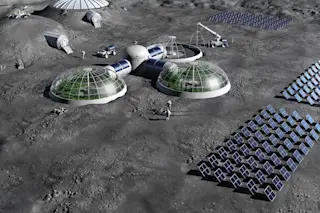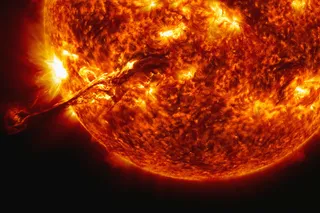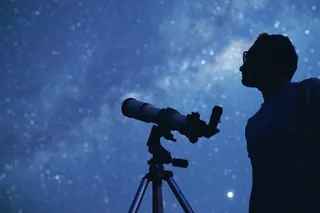The 2020s have already seen many lunar landing attempts, although several of them have crashed or toppled over. With all the excitement surrounding the prospect of humans returning to the Moon, both commercial interests and scientists stand to gain.
The Moon is uniquely suitable for researchers to build telescopes they can’t put on Earth because it doesn’t have as much satellite interference as Earth, nor a magnetic field blocking out radio waves. But only recently have astronomers like me started thinking about potential conflicts between the desire to expand knowledge of the universe on one side and geopolitical rivalries and commercial gain on the other and how to balance those interests.
As an astronomer and the co-chair of the International Astronomical Union’s working group Astronomy from the Moon, I’m on the hook to investigate this question.
Everyone To The South Pole
By 2035 – just 10 or so years away – American and Chinese rockets could be carrying humans to long-term lunar bases.
Both bases are planned for the same small areas near the south pole because of the near-constant solar power available in this region and the rich source of water that scientists believe could be found in the Moon’s darkest regions nearby.
Unlike the Earth, the Moon is not tilted relative to its path around the Sun. As a result, the Sun circles the horizon near the poles, almost never setting on some crater rims. There, the never-setting Sun casts long shadows over nearby craters, hiding their floors from direct sunlight for the past 4 billion years, 90% of the age of the solar system.
These craters are basically pits of eternal darkness. And it’s not just dark down there, it’s also cold: below -418 degrees Fahrenheit (-250 degrees Celsius). It’s so cold that scientists predict that water in the form of ice at the bottom of these craters– likely brought by ancient asteroids colliding with the Moon’s surface – will not melt or evaporate away for a very long time.
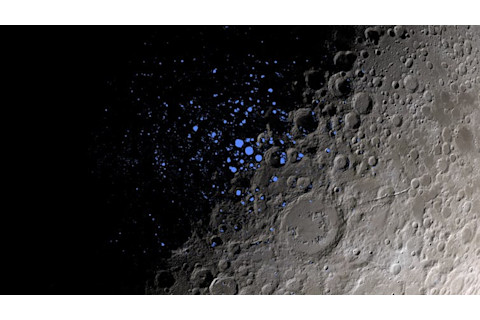
Dark craters on the Moon, parts of which are indicated here in blue, never get sunlight. Scientists think some of these permanently shadowed regions could contain water ice. NASA's Goddard Space Flight Center
Surveys from lunar orbit suggest that these craters, called permanently shadowed regions, could hold half a billion tons of water.
The constant sunlight for solar power and proximity to frozen water makes the Moon’s poles attractive for human bases. The bases will also need water to drink, wash up and grow crops to feed hungry astronauts. It is hopelessly expensive to bring long-term water supplies from Earth, so a local watering hole is a big deal.
Telescopes On The Moon
For decades, astronomers had ignored the Moon as a potential site for telescopes because it was simply infeasible to build them there. But human bases open up new opportunities.
The radio-sheltered far side of the Moon, the part we never see from Earth, makes recording very low frequency radio waves accessible. These signals are likely to contain signatures of the universe’s “Dark Ages,” a time before any stars or galaxies formed.
Astronomers could also put gravitational wave detectors at the poles, since these detectors are extraordinarily sensitive, and the Moon’s polar regions don’t have earthquakes to disturb them as they do on Earth.
A lunar gravitational wave detector could let scientists collect data from pairs of black holes orbiting each other very closely right before they merge. Predicting where and when they will merge tells astronomers where and when to look for a flash of light that they would otherwise miss. With those extra clues, scientists could learn how these black holes are born and how they evolve.
The cold at the lunar poles also makes infrared telescopes vastly more sensitive by shifting the telescopes’ black body radiation to longer wavelengths. These telescopes could give astronomers new tools to look for life on Earth-like planets beyond the solar system.
And more ideas keep coming. The first radio antennae are scheduled to land on the far side next year.
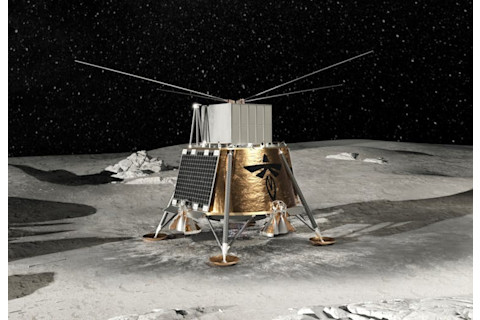
An illustration of LuSEE Night, a NASA and Department of Energy radio telescope planned for the far side of the Moon. Tricia Talbert, NASA
Conflicting Interests
But the rush to build bases on the Moon could interfere with the very conditions that make the Moon so attractive for research in the first place. Although the Moon’s surface area is greater than Africa’s, human explorers and astronomers want to visit the same few kilometer-sized locations.
But activities that will help sustain a human presence on the Moon, such as mining for water, will create vibrations that could ruin a gravitational wave telescope.
Also, many elements found on the Moon are extremely valuable back on Earth. Liquid hydrogen and oxygen make precious rocket propellant, and helium-3 is a rare substance used to improve quantum computers.
But one of the few places rich in helium-3 on the Moon is found in one of the most likely places to put a far-side, Dark Ages radio telescope.
Finally, there are at least two internet and GPS satellite constellations planned to orbit the Moon a few years from now. Unintentional radio emissions from these satellites could render a Dark Ages telescope useless.
The Time Is Now
But compromise isn’t out of the question. There might be a few alternative spots to place each telescope.
In 2024, the International Astronomical Union put together the working group Astronomy from the Moon to start defining which sites astronomers want to preserve for their work. This entails ranking the sites by their importance for each type of telescope and beginning to talk with a key United Nations committee. These steps may help astronomers, astronauts from multiple countries and private interests share the Moon.
Martin Elvis is a Senior Astrophysicist at the Smithsonian Institution. This article is republished from The Conversation under a Creative Commons license. Read the original article.


